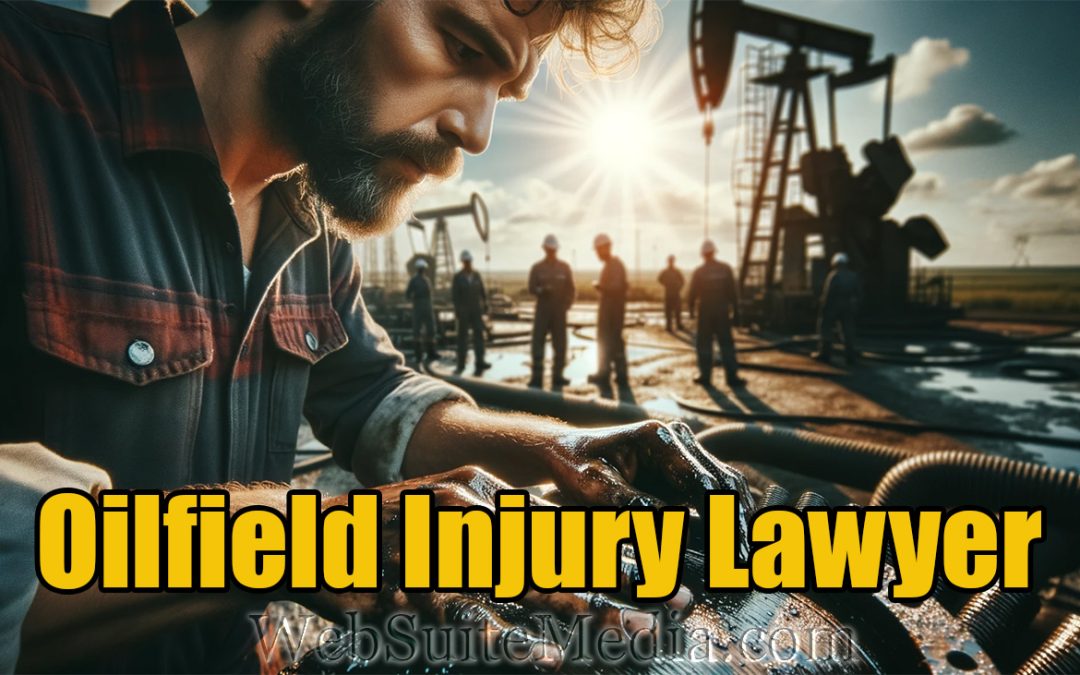7 helpful steps to take before calling a oilfield injury lawyer in Houston, Texas:
Page Contents
- 7 helpful steps to take before calling a oilfield injury lawyer in Houston, Texas:
- Dealing with oilfield injuries can be tough. But with the help of an oilfield injury lawyer in Houston, you can protect your rights.
- Gathering Documents After An Accident
- Preparing Questions Before Your Initial Lawyer Consultation
- Having Clear Goals for Your Initial Lawyer Meeting
- Doing Your Research to Find the Right Lawyer
- Preparing to Discuss Your Accident and Injuries
- Following Your Lawyer’s Guidance
- Exercising Patience During Your Case
- Now, let’s Cover Some Frequently Asked Questions for Oilfield Injury Lawyer in Houston, Texas
Dealing with oilfield injuries can be tough. But with the help of an oilfield injury lawyer in Houston, you can protect your rights.
The hardworking men and women known as roughnecks deserve more than just our admiration; they deserve specialized attention when they find themselves on the unfortunate end of an accident. Roughneck Law provides that much-needed support, ensuring that these unsung heroes don’t have to fight their battles alone.
Here’s some helpful tips to begin:
- Gather relevant documents and records related to the accident, such as medical records, bills, police reports, photos of injuries/damage, and receipts for expenses incurred. Having all pertinent information organized will help the oilfield injury lawyer in Houston evaluate your case.
- Make a list of questions to ask the oilfield accident lawyer during the initial consultation. Important questions include: how much experience do you have with similar cases? What are the strengths and weaknesses of my case? What is your fee structure?
- Know your goals for the initial meeting and what you hope to accomplish. Are you looking for an initial oilfield injury case assessment? Do you want to hire an injury lawyer to represent you? Being clear about your objectives will help ensure you get what you need out of the meeting.
- Research lawyers and law firms to find one with relevant experience in your type of case. Look at their track record of results, client reviews and reputation. This will help you choose a knowledgeable lawyer you feel comfortable with.
- Be prepared to discuss details of the accident and your injuries. The lawyer will need information about liability, damages, effects on your life, and prognosis to evaluate your potential case.
- Listen to the lawyer’s legal advice and take appropriate action. For example, follow guidance on obtaining treatment, interacting with insurance companies, preserving evidence, etc.
- Be patient throughout the legal process. Oilfield accident cases can take time to resolve through settlement negotiations or trial. Trust your lawyer to handle matters appropriately while you focus on your recovery.
Legal Professional Disclaimer: WebSuite Media, the publisher of this helpful article, is not a law firm or licensed law professionals in any state or jurisdiction. See end of article for details.
 Now that you have the listed overview about consulting a oilfield injury lawyer in Houston, dive into the full course of action below:
Now that you have the listed overview about consulting a oilfield injury lawyer in Houston, dive into the full course of action below:
Gathering Documents After An Accident
Being involved in any kind of accident can be stressful and overwhelming. Your focus is likely on physical and emotional recovery. However, it is also important to start gathering information and documentation as soon as possible after an accident. This will help support your potential oilfield accident claim and provide your lawyer with the details needed to build a strong case on your behalf.
Here are some key documents and records to collect:
- Police reports – Any police reports from the accident scene are crucial. Be sure to obtain the official accident report, witness statements, and any citations issued. Police reports contain key details about how the accident happened, who was at fault, witness accounts, and more.
- Medical records – All records related to medical treatment you receive for accident-related injuries are vital. This includes emergency room and hospital records, ambulance/EMS reports, doctor visit notes, specialist referrals, physical therapy notes, and any diagnostic test results like x-rays or MRIs. Medical records substantiate your injuries and treatment.
- Bills and receipts – Keep track of all bills, invoices, receipts and expenses related to the accident. This includes medical bills, prescriptions, medical equipment, property damage estimates and repairs. These documents help tally the economic damages in your injury claim.
- Photographs – Take clear, well-lit photos of any visible injuries like cuts, bruises or broken bones. Also photograph damage to vehicles, property or equipment involved in the accident. Photos serve as visual evidence to document the extent of damages.
- Employment records – If you missed work due to the accident, obtain records from your employer showing lost wages. This could include pay stubs, disability slips, leave request forms or correspondence with supervisors related to your absence.
- Insurance information – Compile details on relevant insurance policies, including your own and any other parties involved (like the at-fault driver). This includes insurance company names, policy numbers, claim numbers, coverages and contact information.
Thoroughly documenting an accident creates a paper trail that can significantly impact the outcome of an oilfield accident case. Keep all these records organized and safely stored. Be prepared to provide copies to your attorney during your initial consultation so they can review and evaluate the strength of your potential claim. The more evidence you can supply, the better!
Preparing Questions Before Your Initial Lawyer Consultation
After an accident, one of the most important steps is choosing the right oilfield accident lawyer. The initial consultation presents a key opportunity to vet attorneys and firms to find the best fit for your case.
Going into this first meeting prepared with a list of questions is vital. Asking the right questions helps you better understand the lawyer’s experience, fee structure, case strategy and more. With limited time, having questions ready ensures you get the information needed to make an informed decision about potential representation.
Here are some important questions to consider asking during an initial oilfield accident consultation:
- How many years have you practiced oilfield accident law? Look for extensive expertise handling cases similar to yours. Ask about their overall success record and history getting favorable verdicts or settlements for clients.
- What is your approach for building a strong case? A lawyer should have a clear strategy for establishing liability, proving damages, negotiating with insurance companies and taking a case to trial if needed.
- What are all costs and fees for your services? Clarify their fee structure, rates, retainers, expenses and what’s included in representation. Make sure you understand what you would owe throughout the case.
- What are the strengths and weaknesses of my potential case? A lawyer should provide an honest assessment of how strong your case looks, potential issues and realistic expectations on outcome.
- How will you keep me updated on case progress? You need confidence the lawyer will regularly communicate details on important developments, next steps and status.
- How much of my case would you personally handle? If other attorneys or paralegals will be involved, understand who does what to ensure the lawyer you meet with directly oversees your case.
- Can you share past client testimonials or reviews? Third party reviews and feedback can give helpful insight into a lawyer’s skills, communication style and professionalism.
Being well prepared with thoughtful questions sets you up to have a productive initial meeting. It can lead to finding the right lawyer to successfully handle your oilfield accident claim.
 Having Clear Goals for Your Initial Lawyer Meeting
Having Clear Goals for Your Initial Lawyer Meeting
The initial consultation with a potential oilfield accident lawyer is a pivotal moment. This first meeting sets the tone for your professional relationship and case trajectory. Going in with clear goals and expectations is key to having a productive session that meets your needs.
Assess Expertise
A top priority is gauging the lawyer’s skill and experience. You want to get a sense of their track record with similar cases, success at reaching favorable outcomes for clients and overall competence level. Ask questions about past results, case strategies and credentials to understand their capabilities.
Seek Case Assessment
Make sure to get the lawyer’s honest opinion about your situation during the initial meeting. They should provide insight on liability, strength of evidence, value of damages, insurance issues and more. You need to know if they view your case as strong or weak, and understand their analysis.
Discuss Representation
An important objective is finding out if the lawyer is willing and able to take your case. Gauge their interest level in representing you and availability. Be prepared to explain key details to allow them to decide if it aligns with their expertise and current caseload.
Review Costs
Understanding what you would owe in legal fees, retainers, expenses and other costs is essential. Get specifics on their rates, payment options and what is included. This financial information will shape your decision on hiring them.
Build Rapport
While assessing credentials, you also want to establish an initial connection. Make sure you feel comfortable with their communication style and personality. You’ll be working closely together, so it helps to start building a positive rapport.
Going into your first lawyer meeting with clear goals allows you to efficiently get the information you require. You can exit with a good understanding of their skills, case outlook and costs to make an informed choice. Being focused and prepared leads to a consultation that meets your needs.

Doing Your Research to Find the Right Lawyer
Choosing the right lawyer to handle your oilfield accident claim is a very important decision. You want an attorney with proven expertise and success handling cases similar to yours. Taking time to thoroughly research options in your area is key to identifying the best attorney for your needs.
There are a few ways to research lawyers and law firms:
- Online reviews – Check sites like Google, Yelp and Avvo for reviews of local attorneys. Look for ones with consistently positive feedback and high ratings. Read reviews to get insight into their legal skills, professionalism and client service.
- Referrals – Ask friends, family members or colleagues if they can recommend an oilfield accident lawyer they’ve used before. Referrals from people you trust are a great way to find reputable attorneys to interview.
- Case results – Look up lawyers on their firm websites and in legal directories to view their case results. An impressive track record of large verdicts and settlements in similar cases is a good sign.
- Professional memberships – Search lawyer directories like Martindale-Hubbell to find ones who are members of respected legal organizations, which indicates expertise and credibility in their field.
- Specialization – Narrow your search to lawyers who specifically focus on your type of injury like motor vehicle accidents, slip and falls, medical malpractice, etc. Avoid general practice attorneys.
- Bar association – Your state bar association website lets you search profiles of licensed attorneys in your city or county. This is a good starting point.
Taking time to thoroughly research lawyers using these methods increases your chances of selecting one who is the perfect fit for you and your case. Finding an attorney with proven experience maximizes your likelihood of a successful claim outcome.
Preparing to Discuss Your Accident and Injuries
A key part of the initial consultation with an oilfield accident lawyer is being ready to provide details about the accident and resulting injuries. The lawyer will need this information to conduct an initial assessment of your potential claim.
What to discuss about the accident:
- Date, time and location of when the accident occurred
- What led up to the accident happening
- Who was involved (names if known)
- Description of how the accident happened
- Details on factors that may show liability like weather, road conditions, speed, traffic controls, impairment, etc.
What to discuss about your injuries:
- What parts of your body were injured
- Types of injuries like cuts, broken bones, head trauma, whiplash, etc.
- Severity of injuries
- Pain levels
- Diagnostic tests conducted like x-rays, CT scans or MRIs
- Treatments received like stitches, surgery, prescription medication
- Ongoing symptoms like headaches, dizziness, numbness
- Prognosis from your doctor
- Impact on daily activities like work, hobbies, self-care
Records to bring:
- Medical records
- Bills and expenses
- Photos of injuries
- Insurance information
Being prepared to thoroughly discuss the accident and injury details enables the lawyer to better evaluate liability issues and the value of potential damages for settlement negotiations or trial. The more details you can provide upfront, the better!
Following Your Lawyer’s Guidance
After hiring an oilfield accident attorney, an important next step is listening to their legal advice and recommendations. Your lawyer has extensive expertise guiding clients through the claims process. Following their counsel can significantly impact your ability to obtain maximum compensation.
Here are some key areas where you should follow your attorney’s guidance:
Medical Treatment
Your lawyer may advise you to seek additional treatment with certain specialists, undergo diagnostic tests, attend physical therapy, etc. This helps fully document your injuries and recovery progress. Though you may feel ready to stop treatment, their legal perspective on proving damages should direct next medical steps.
Interactions with Insurance Companies
Your attorney will likely instruct you not to speak to insurance adjusters directly. They may also request you to refer inquiries to them, as they are best positioned to communicate with insurers on the legal nuances of your claim.
Preserving Evidence
Listen if your lawyer says to preserve or not dispose of items like photographs, damaged property, medical devices, etc. They understand what evidence could be useful for investigations, negotiations or trials.
Lawsuit Proceedings
If your claim leads to a lawsuit, look to your attorney on matters like submitting legal documents, providing depositions, appearing at court hearings, etc. They will guide you on properly following lawsuit procedures.
Settlement Decisions
Before accepting any settlement offer, consult your attorney on the amount and terms. They can best advise if the offer seems fair based on factors like liability, a jury’s perspective, and avoiding trial.
Trusting your lawyer’s counsel puts you in the strongest position to receive full and fair compensation in your oilfield accident claim. Their legal expertise steers the best path forward.
Exercising Patience During Your Case
After a serious accident, it’s natural to want your oilfield injury claim resolved as quickly as possible. However, it’s important to understand these legal processes often take significant time, and to mentally prepare for a lengthy duration. Having patience throughout your case allows your lawyer to get you the maximum compensation you deserve.
Here are some key reasons it pays to be patient:
- Thorough investigation – Your lawyer needs to fully investigate what happened, determine all liable parties, establish negligence, and build a strong argument for damages owed. This takes extensive time but builds a solid foundation for your claim.
- Obtaining medical records – It can take weeks or months for your lawyer to collect and review all pertinent medical reports, treatment notes, test results, prognosis reports, and expenses. These comprehensive records are vital.
- Settlement negotiations – Your lawyer will likely have lengthy back and forth discussions with insurance companies to reach a fair settlement. This involves evaluating claim value, making offers and counteroffers, and determining if settlement or trial is the best option.
- Waiting for court dates – If your claim goes to trial, there may be significant wait times for court dates to be set, then rescheduled. The whole trial process can take over a year in some cases.
- Appeals process – If you win at trial, the defense can file appeals that prolong the case. Appeals must be heard before you receive compensation.
Though it can be frustrating at times, remember your lawyer is working diligently behind the scenes at every step. Trust their legal expertise to guide your case, and avoid pressuring for premature resolution. With patience, you increase the likelihood of a successful outcome.

Now, let’s Cover Some Frequently Asked Questions for Oilfield Injury Lawyer in Houston, Texas
Q: Why should I hire an oilfield injury lawyer in Houston?
A: Hiring an oilfield injury lawyer in Houston is essential because they specialize in this area of law. They have the knowledge and experience to navigate the complexities of oilfield injury cases, ensuring you receive the compensation you deserve for your injuries and losses.
Q: What types of oilfield injuries can a lawyer help with?
A: An oilfield injury lawyer in Houston can assist with a wide range of injuries that occur in oilfields, including burns, chemical exposure, falling objects, hazardous environment-related issues, equipment malfunctions, machinery accidents, and more. They can handle all types of oilfield injury claims.
Q: How long do I have to file an oilfield injury claim in Houston, Texas?
A: In Houston, Texas, you typically have two years from the date of the injury to file an oilfield injury claim. However, it is crucial to consult with an oilfield injury lawyer as soon as possible to ensure you meet all applicable deadlines and preserve your rights.
Q: What compensation can I receive for my oilfield injury?
A: The compensation you may receive for your oilfield injury can vary depending on the circumstances of your case. However, it may include medical expenses, lost wages, pain and suffering, disability benefits, rehabilitation costs, and other damages related to your injuries. An oilfield injury lawyer can evaluate your case and determine the appropriate compensation to pursue.
Q: How much does it cost to hire an oilfield injury lawyer in Houston?
A: Most oilfield injury lawyers in Houston work on a contingency fee basis. This means that they only receive payment if they successfully recover compensation for your case. The fee is typically a percentage of the amount recovered, ensuring you do not have to pay upfront legal fees.
Q: How do I choose the right oilfield injury lawyer in Houston?
A: When selecting an oilfield injury lawyer in Houston, it is essential to consider their experience, track record, reputation, communication skills, and resources. Additionally, it is recommended to schedule a consultation to discuss your case and determine if they are the right fit for you.
Citations:
[1] https://grahamlawga.com/how-to-prepare-to-meet-with-a-personal-injury-lawyer-7-things-to-know/
[2] https://stokesstemle.com/blog/personal-injury-claim-process/
[4] https://www.philpotlawfirm.com/the-7-steps-of-a-personal-injury-case/
[5] https://taylormartino.com/7-steps-of-a-personal-injury-case/
Legal Professional Disclaimer: WebSuite Media, the publisher of this helpful article, is not a law firm or licensed law professionals in any state or jurisdiction. This is not legal nor financial advice. We aim to help you on your journey and assist you in your own due diligence. WebSuite Media is a professional digital marketing firm, helping qualifying individuals come into contact with some of the best professional providers in certain fields of business. We work to vet out the most responsible and effective professional service providers. We are very effective at putting qualifying professionals in front of their potential clientele. If you are, or happen to know professionals of the highest caliber, please have them reach out to us at: https://WebSuiteMedia.com


